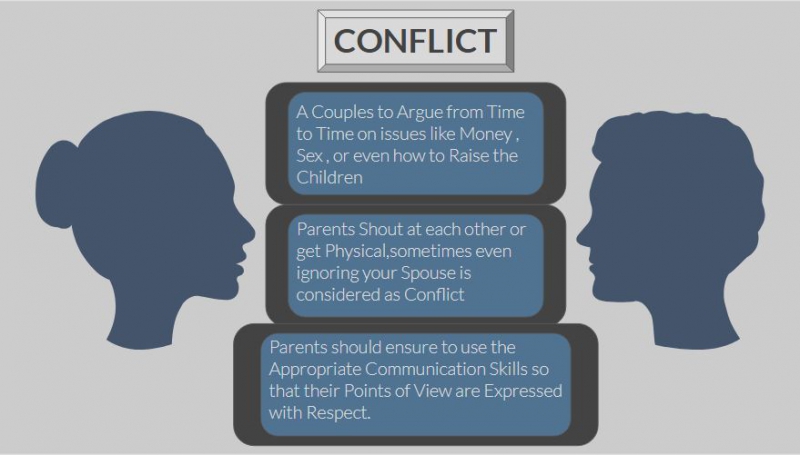Children who suffer physical or emotional conflict from their parents do not read or trust other people's feelings. Parental conflict can affect the emotional processing ability of a child, distracting and interfering with neutral interactions, and becoming an adult can lead to worsening interpersonal relationships.
Parental conflict
It is not uncommon for a couple to have conflicts occasionally for various reasons. I have come across different opinions from money problems to child rearing laws. However, if the emotions are seriously hurt, they can affect their children by shouting at each other, aggressive behavior, and neglecting their opponents. The most desirable way is to find a solution in the right direction by respecting the other's opinion with proper communication.
Of course, even if you do not live with your parents, divorced, or separated, conflicts between your parents can occur.
 |
| ▲ Parents should be able to resolve conflicts with proper communication |
Parental conflict and emotional impact of children
A team of researchers from the University of Vermont conducted an experiment with 99 children aged 9-11 by dividing them into two groups according to their level of conflict. The way to divide groups was based on various psychological tests such as how much the child experiences parental conflict. Experiments using photographs were also carried out. The children classified the pictures by judging whether the couple in the picture was angry, happy, or neutral.
The results showed that children who grew up in low-level parental conflicts correctly perceived the couples' facial expressions in the photographs, but children with high levels of parental conflict were able to recognize only the pictures of happy or angry couples. These children were not convinced of the pictures of couples with neutral interactions that were classified as happy, or pictures of anger, or where to classify them.
In a related study, Alis Harmher Horn, lead author of the study, explained that the study could yield two possible conclusions about attitudes and attitudes that are indifferent to arousal or neutral parental interactions. First and awakening, when a child perceives a threat or conflict, he or she self-monitors by interpreting the neutral expression as anger. The second is more consistent with the interaction of happiness or anger, and therefore does not understand or has little information about neutral interactions.
The study also showed that children who were shy and introverted were not able to pinpoint pictures of neutral interactions, even if parental conflicts were low. The shy disposition made them more vulnerable to parental conflicts, and children in shy and parental conflicts did not show high accuracy in properly sorting neutral interaction pictures. Professor Shemmer Lehorn warned parents of shy-minded children need to be extremely careful about how the couple expresses conflict, especially.
Other influences
Parental conflict can affect not only a child 's emotional perception but also emotional stability, academic performance and disability.
Emotional instability can prevent behavior from leading or interacting properly with others, but it can also lead to a lower self-esteem and a tendency not to express one's feelings outside. It can also experience dysfunctions such as learning disabilities, enuresis, ulcers, and repeated nightmares.
Schermerhorn said the conflict at home can not be solved, but it is important for parents to understand that even if they are in conflict, they always love each other and understand that things will be done well.
![[Parenting] Parent conflict … Adverse effects on your child’s emotional processing ability parenting parent conflict adverse effects on your childs emotional processing ability](https://moontore.com/wp-content/uploads/2019/02/parenting-parent-conflict-adverse-effects-on-your-childs-emotional-processing-ability-1200x700.jpg)


